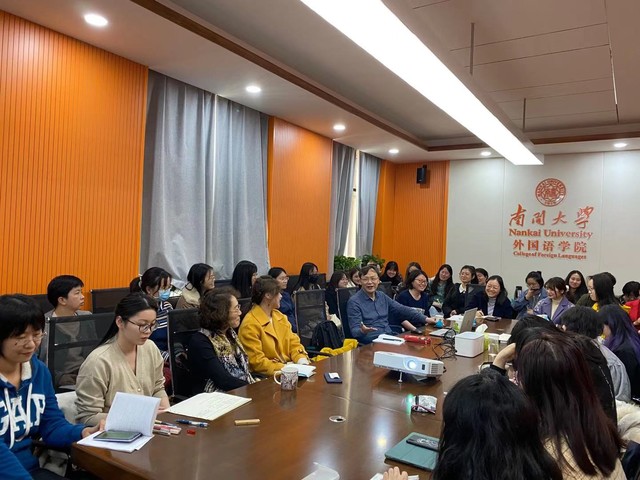
On the afternoon of March 12, 2021, Professor Zeng Yanbing, a professor of Renmin University of China and a doctoral supervisor, visited the College of Foreign Languages in Nankai University and gave a wonderful lecture entitled Agamben’s ideas on Kafka.
First of all, Professor Zeng Yanbing talked about the necessity and particularity of re-studying and thinking about classic texts in the background of anti-epidemic campaign, focusing on the practical care and current significance of academic research. Furthermore, taking Nietzsche and Heidegger's commentary on Plato as examples, he proposed the research on the interpretation of a master by another master as the starting point of literary research. This alternative research method not only provides the students with a clear view on the topic selection of thesis, but also inspires the extended research of literary classics. Subsequently, Professor Zeng summarized Agamben's research path on Kafka from three aspects: evidence deriving from a language, law and power of law, and the transformation of life into scripture. He believed that Agamben's expertise in the field of linguistics contributed to his early research on Kafka which regards language as the starting point, and he utilized the identity of the protagonist K in The Castle and The Judgment as an example to point out K is not only the initial letter of the Latin false accusation, but also implies an ancient Roman land surveying tool. Next, Professor Zeng used the law, the effective word, as an introduction, and turned from linguistics to the investigation of legal issues in Kafka's works; and from the obstruction and questioning of before the law, he proposed that the door of the law should be closed, which means the door of religion was opened at the same time. Finally, Professor Zeng pointed out that the uniqueness of Agamben’s theory of Kafka is that he reinterpreted Kafka in a Kafka-style of writing, innovating the old concepts and bringing forth the new, showing the openness and nondeterminacy of Kafka’s text. However, as a legal and philosophical text interpretation, it also has its limitations, which is slightly stuffless.
In the interactive session, students asked questions enthusiastically, and the enthusiasm of the masses ran high. Professor Zeng gave patient and meticulous answers to the questions raised, which benefited the audience a lot. The lecture ended successfully with thunderous applause.
Zeng Yanbing is a second-level professor and doctoral supervisor at Renmin University of China, editor-in-chief of the copy of Foreign Literature Studies in Renmin University of China; director of the Chinese Society of Comparative Literature, executive director of the Specialized Committee for Foreign Literature of the Chinese Higher Education Association, and deputy director of the Interdisciplinary Research Committee for Foreign Literature of the China University Alliance for the Development of Foreign Language and Literature Discipline. She mainly engaged in study of Western literature and the comparative study of Western literature and Chinese literature, post-modern literary and cultural studies, and Kafka studies. Moreover, she also presided over the key project of the National Social Science Fund Research on the Relationship between Kafka and Chinese Literature and Culture, and her representative works include: Western Modernist Literature Research, Oriental Postmodernism, Kafka and Chinese Culture, Studies on Kafka, Kafka's Eyes, Towards Comparative Poetics, and Postmodern Literature and Culture and so on. Furthermore, more than 300 academic papers written by her have been published in such journals as Foreign Literature Review, Foreign Literature Studies, Foreign Literature, Foreign Literatures, Contemporary Foreign Literature, Literature and Art Studies, Literary and Artistic Contention, Theoretical Studies in Literature and Art and other publications, and she also published translations and academic essays with more than one hundred thousand words.



